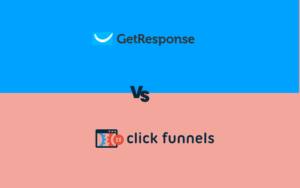Email marketing is a skill that requires you to balance factors that need to be tested and verified through trial and error. Tough pill to swallow, but if you ask me, the wrong email marketing tool will burn you. How do you know email marketing software is not your best fit?
The answer lies in understanding the features, functionality, and user experience that align with your specific needs. Choosing the right email marketing software can make or break your campaigns, affecting everything from deliverability rates to automation capabilities.
In this article, we will explore the best email marketing software options available, highlighting how each can streamline your campaigns and enhance your marketing efforts. Whether you’re a small business owner or a seasoned marketer, finding the perfect tool is essential for achieving your goals and maximizing your email marketing success.
MailChimp – Best Email Marketing Software for Simplicity
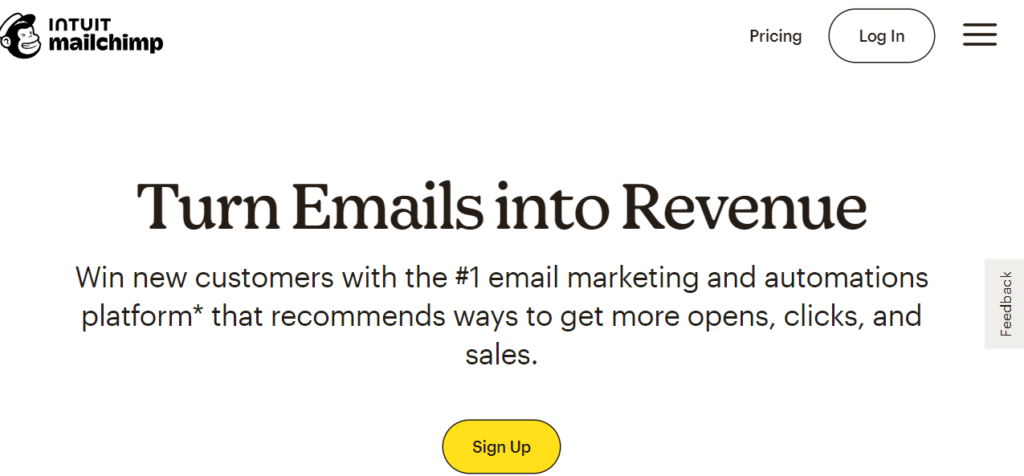
Most people know MailChimp thanks to its free option and versatility, which are desirable for small and mid-size companies. The best thing about MailChimp is that you can send bulk emails with a 92% surety that they will land in the desired inbox. Your emails won’t bounce or land in spam. MailChimp has worked with email service providers (ESPs) to ensure that emails get sent.
Another important feature of MailChimp is that you can batch up to 10,000 emails and send them every minute with a nearly 100% success rate while still looking like an individual sent them. I can’t say the same for other email marketing software like Joomla.
MailChimp offers an easy-to-use stage with highlights like easy-to-use email layouts and two email editors are available, and you can send different types of emails, including newsletters, autoresponders, RSS & transactional emails, and A/B testing.
If integration is important to you, you will like MailChimp since it offers hundreds of integrations that works well for bloggers, e-commerce stores, nonprofits, and small businesses. You will also like the ability to segment your emails, which means you can send different emails to different people. For example, if you have a decor website, instead of sending a similar newsletter, you can send emails that correspond to the subscriber’s needs, such as those browsing curtains and those browsing flower pots.
However, MailChimp is not without its drawbacks. Since it was acquired by Intuit, the free version limits users to 500 contacts, down from 2000 contacts. Automation is also not possible with the free version. According to this user, she saw her bill go up without MailChimp contacting her when her capacity for contacts went up.
MailChimp is a decent tool for powering up your email marketing customer journey. You will like the easy-to-use interface as it has a smooth learning curve. You will find the customer journey tools intuitive, with multiple choices for your audience. That’s why it’s our top recommendation for the best email marketing software.
Brevo
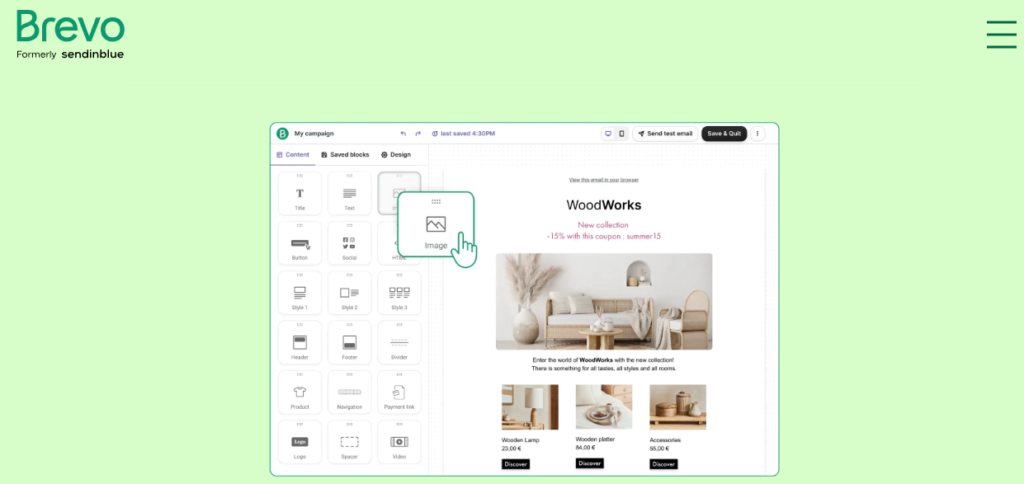
Brevo, formerly known as Sendinblue, is highly regarded in the email marketing space, particularly for its comprehensive feature set and affordability. It’s an excellent choice for small to mid-size businesses looking to scale their email marketing efforts without breaking the bank. One standout feature of Brevo is its robust send-time optimization, ensuring that your emails reach recipients at the most effective times.
Brevo users can send up to 300 emails per day for free, making it a great option for startups and smaller businesses. For higher volumes, their paid plans allow you to scale up your email-sending capacity significantly. This reliability in email delivery sets Brevo apart from other platforms that might struggle with high-volume sends.
Brevo provides an intuitive interface with drag-and-drop email builders, making it easy for users to create professional-looking emails without needing advanced technical skills. The platform supports various email types, including newsletters, transactional emails, and automated workflows. A/B testing is also available, allowing you to optimize your email content for better performance.
One of Brevo’s strengths is its extensive integration capabilities. It connects seamlessly with various platforms, including e-commerce sites, CRMs, and CMSs, making it a versatile choice for different business needs. The platform’s highly advanced segmentation features enable you to target specific groups within your audience with tailored messages. This benefits businesses with diverse product offerings or services, allowing for more personalized and effective email campaigns.
Brevo is known for its affordability, especially when compared to competitors. Their pricing model is based on the number of emails sent rather than the number of contacts, which can be more cost-effective for businesses with large mailing lists. This flexibility makes it easier for businesses to manage their marketing budgets while still achieving high email deliverability and engagement rates.
While Brevo offers a robust free plan, some advanced features are locked behind their paid plans. For instance, the free plan does not include advanced reporting and analytics, which are essential for businesses looking to gain deeper insights into their campaign performance. Additionally, some users have noted that Brevo’s customer support could be better. Furthermore, Brevo’s user interface and user experience are not the best, making it more suitable for tech-savvy users who can navigate its complexities.
Brevo stands out as a powerful and cost-effective email marketing tool for businesses of all sizes. Its high deliverability rates, user-friendly interface, and advanced segmentation capabilities make it an excellent choice for those looking to enhance their email marketing strategies. While there are some limitations with the free plan, the platform’s overall value and scalability make it a strong contender for the best email marketing software.
HubSpot
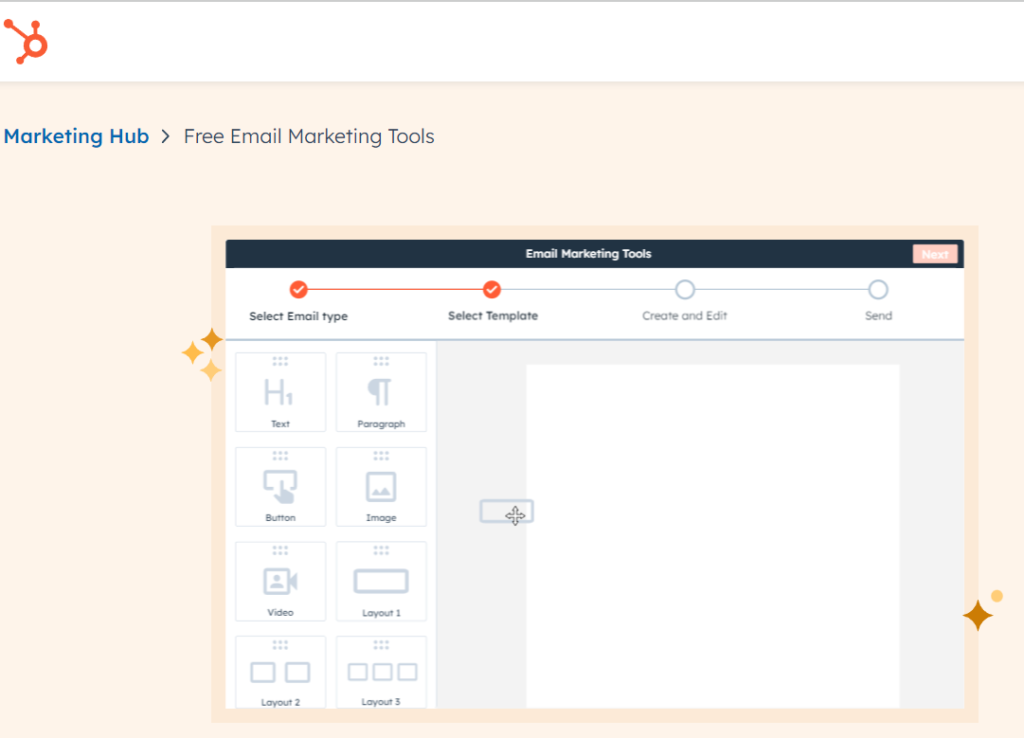
HubSpot is a well-known player in the marketing software arena, particularly favored for its robust CRM integration and extensive marketing automation features. It is an excellent choice for small to mid-size businesses looking to streamline their email marketing efforts and align them with broader marketing and sales activities. HubSpot’s AI-powered email subject line optimization and predictive lead scoring are standout features that help maximize campaign effectiveness.
HubSpot ensures high deliverability rates, with emails reliably landing in the recipient’s inbox. This is crucial for businesses sending bulk emails, as it helps maintain a good sender reputation and maximizes engagement rates. HubSpot’s email marketing tool is designed to handle high-volume sends without compromising deliverability, which is essential for growing businesses.
HubSpot offers a clean, intuitive interface that makes it easy for users to create and manage email campaigns. Its drag-and-drop editor allows for the quick creation of visually appealing emails, even for those with minimal technical skills. The platform supports various email types, including newsletters, transactional emails, and automated workflows. HubSpot’s AI-powered tools also help optimize email subject lines and content for better performance, ensuring your messages resonate with your audience.
One of HubSpot’s major strengths is its seamless integration with its CRM and other marketing tools. This allows for a unified view of customer interactions and more effective marketing strategies. The platform’s advanced segmentation capabilities enable businesses to target specific audience segments with personalized messages. This level of customization is vital for businesses aiming to deliver relevant content to their subscribers, thereby increasing engagement and conversions.
HubSpot offers various pricing plans to suit different business needs and budgets. While its free plan provides basic email marketing features, the paid plans unlock more advanced functionalities, such as detailed analytics and enhanced automation. This scalability makes HubSpot a cost-effective choice for businesses as they grow, allowing them to expand their email marketing efforts without significant additional investment.
While HubSpot’s free plan is generous, offering a range of basic features, some more advanced tools and analytics are only available in the higher-tier plans. This can be a limitation for smaller businesses with tight budgets. Additionally, some users have reported a learning curve when starting with HubSpot, although the extensive support resources and tutorials provided can help mitigate this.
HubSpot is a powerful and versatile email marketing solution that integrates seamlessly with other marketing and sales tools. Its high deliverability rates, user-friendly interface, and advanced segmentation capabilities make it an excellent choice for businesses looking to enhance their email marketing strategies. While the free plan has its limitations, the platform’s overall value and scalability make it a top contender in the email marketing software landscape.
ActiveCampaign
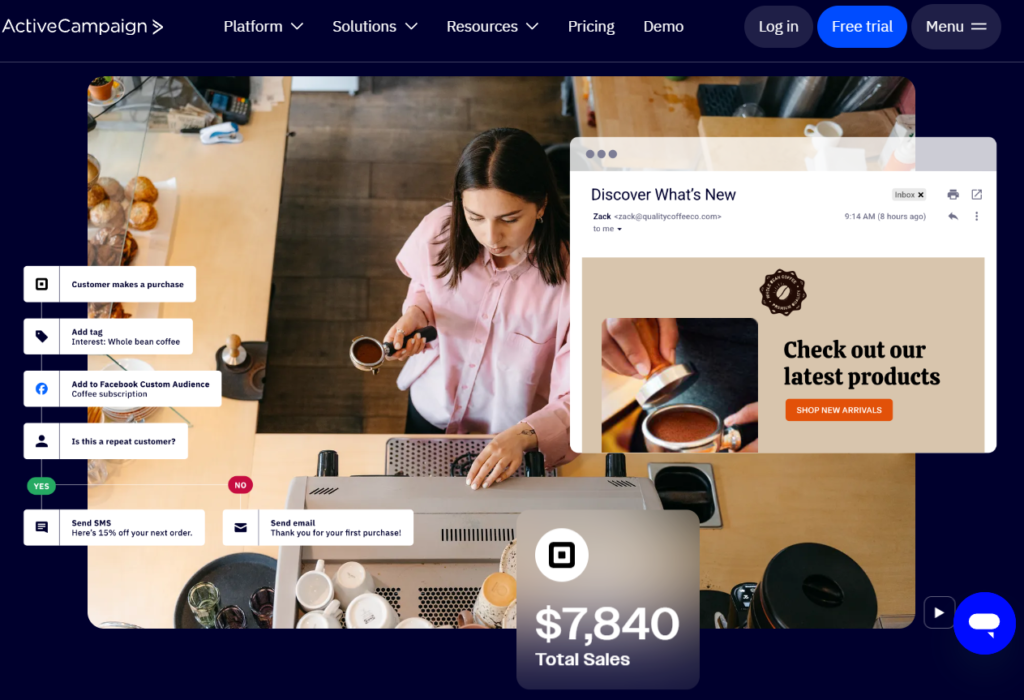
ActiveCampaign is one of those tools that outshines its competition owing to its intuitiveness. I picked it in my list of the best email marketing software because of its flexible automation features. But don’t go for it yet. If you ask me, ActiveCampaign is for the tech-savvy. If you have never set up an email marketing campaign, you will not have it easy with ActiveCampaign. It’s best to go for a simpler option like Brevo or MailChimp.
ActiveCampaign has many features on its dashboard that can initially feel overwhelming. You will see the social activity feed on the right and an overview of the campaign’s activity on the left. The drag-and-drop editor allows you to save custom blocks to reuse later. You can also see the changes that others have made. You can also edit code directly into the template editor. Moreover, you can also add actions, such as actions when a customer interacts with elements in an email, which is great for segmentation.
ActiveCampaign has made marketing automation the center of its focus. You can automate anything from contact management, SMS, e-commerce automation, and deals. You will like that it has included marketing automation in all its plans, although the sales automation feature is for those on the Plus or higher plans.
A unique feature of ActiveCampaign is being able to trigger automation directly from your inbox communication with potential leads. However, you need to enable the Sales Engagement CRM add-on, which is quite steep at around $150 per month. Still, you will enjoy 750 automation templates, a built-in CRM, and 56 responsive landing page templates.
ActiveCampaign remains ahead of the email marketing game despite its high deliverability. It beats MailChimp and Mailerlite since it scored 93% on the deliverability test, while MailChimp scored 92% and Mailerlite scored 92.7% according to experts.
ActiveCampaign offers many marketing features and is one of the best email marketing software. It has lots to offer, including unlimited emails and a large library of online resources to help you if you get stuck. Its automations will impress you, making it a one-stop email marketing shop.
MailerLite

MailerLite is just as popular as MailChimp owing to its affordable plans and its modern, clean interface. Perhaps the best feature of MailerLite is that if offers a Free Forever plan for up to 1000 subscribers and 12,000 emails per month. Thus, it’s an excellent platform if you are starting out in the email marketing world and don’t want to waste money before mastering the whole process.
MailerLite offers a wide range of features, from email campaigns to landing pages, and even Facebook integration. The easy-to-use User Interface is a breeze for beginners. You will find a clean dashboard with everything laid out well so that it’s easy to find. Moreover, the email campaign builder will allow you to create regular, RSS feed, A/B split, and auto-resend campaigns.
MailerLite features 90 pre-made email templates organized in 12 categories. You will be able to use them for various occasions such as RSS campaigns, notifications, events, holidays, etc. Another feature we liked is the email marketing automation which will allow you to create workflows based on your campaign actions such as links clicked. You can also perform A/B tests on different subject lines and campaign emails.
Finally, MailerLite allows you to segment your contacts through its automations where you can segment subscribers based on different variables. You will find it easy for creating forms and subscribe buttons, plus a high deliverability that will ensure your emails rarely bounce or end up in the spam folder.
Klaviyo
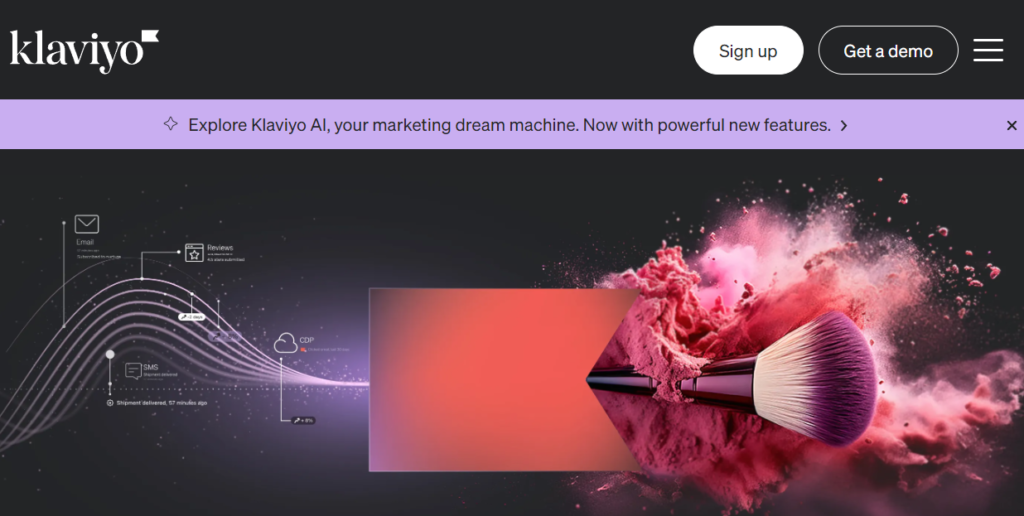
Klaviyo is a full-featured email marketing platform that focuses on sales. Its intuitive and user-friendly interface features a drag-and-drop email builder, which makes it easy for even those with minimal technical skills. The dashboard is clean and well-organized, allowing you to navigate effortlessly between different features.
Klaviyo offers a variety of subscription plans to cater to different business sizes and needs. The pricing is based on the number of contacts, starting with a free plan for up to 250 contacts and 500 emails. Paid plans scale with the number of contacts, offering advanced features such as predictive analytics, customer support, and enhanced segmentation.
Klaviyo provides a wide range of customizable email templates. These templates are designed to be responsive and visually appealing, ensuring that emails look great on any device. You can easily tweak these templates to match your brand’s style and requirements.
Klaviyo boasts excellent deliverability rates. Its robust infrastructure ensures that emails reach the inbox rather than the spam folder. Klaviyo’s deliverability tools, such as list cleaning and suppression management, help maintain a high sender reputation and improve email performance.
One of Klaviyo’s standout features is its powerful automation capabilities. You can create complex workflows based on customer behavior, segmentation, and triggers. This allows businesses to send personalized emails at the right time, enhancing customer engagement and driving conversions.
Klaviyo is ideal for e-commerce businesses and online retailers looking to leverage customer data for targeted email marketing. Its deep integration with platforms like Shopify and Magento makes it a perfect choice for businesses that want to automate their email campaigns based on customer interactions and purchase history. Additionally, companies of all sizes can benefit from Klaviyo’s scalable features and flexible pricing plans.
Overall, Klaviyo stands out as the best email marketing software for e-commerce businesses, aiming to maximize customer relationships and sales through sophisticated email marketing strategies.
GetResponse
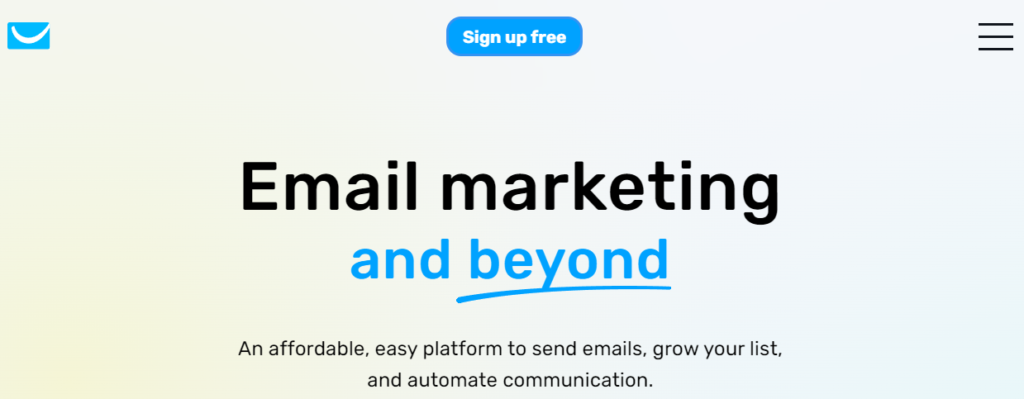
GetResponse is perhaps the best entry point to email marketing. The straightforward user interface makes it easy for anyone to start setting email campaigns in a cinch. Whether you’re new to email marketing or an experienced user, you’ll appreciate its intuitive design. The drag-and-drop email editor simplifies the creation of professional emails without requiring technical skills.
GetResponse provides flexible subscription plans tailored to different needs. You can start with a free trial to explore its features. Paid plans are tiered based on the number of contacts, starting with the Basic plan and progressing to Plus, Professional, and Max. Each tier adds more advanced features, making finding a plan that suits your business requirements and budget easy.
You’ll find a wide variety of customizable email templates in GetResponse. These templates are designed to be visually appealing and responsive, ensuring your emails look great on any device. The extensive template library covers various industries and use cases, allowing you to find the perfect design for your campaign.
GetResponse is known for its strong deliverability rates. It employs advanced tools to help you maintain a good sender reputation and ensure your emails land in the inbox, not the spam folder. Features like list hygiene, spam check, and email authentication support high deliverability standards.
GetResponse excels in automation, offering a range of tools to streamline your email marketing efforts. You can set up automated workflows based on user behavior, preferences, and triggers. This allows you to send personalized messages at the right time, improving engagement and conversion rates.
GetResponse suits businesses of all sizes, from small startups to large enterprises. It’s particularly beneficial for companies looking to integrate email marketing with other digital marketing strategies, such as webinars, landing pages, and CRM. E-commerce businesses, in particular, will find value in GetResponse’s automation and analytics features, which help optimize customer communication and drive sales.
Overall, GetResponse is a versatile and powerful email marketing solution combining ease of use and advanced features. It is a great choice for businesses looking to enhance their email marketing efforts.
Conclusion
The best email marketing software can solidify your email marketing strategy. After sending our your campaigns, remember to track your successes and failures to ensure you know what’s working and what’s not. We hope these email marketing tools can give you the headstart you need in your marketing journey. If you are a beginner, GetResponse offers the tools you need to play around and get it right the first time. However, if you have tinkered before and know your way around email marketing software, ActiveCampaign is the perfect choice, while Klaviyo offers the best features for e-Commerce businesses.
Some links on this website are affiliate links, we may earn a commission if you make a purchase through them at no additional cost to you. Thank you for your support!



